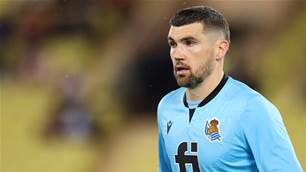New UEFA president Michel Platini admits football authorities are limited in what they can do to prevent hooliganism.
There have been several instances of football-related violence across Europe in recent weeks.
A policeman was killed in Catania during rioting at the Sicilian derby against Palermo on February 2.
Sevilla coach Juande Ramos was hit on the head by a thrown bottle during his team's Copa del Rey match against rivals Real Betis last week.
And in France, there was crowd trouble in last weekend's Ligue 1 games at St Etienne and Sedan.
A fractious Rhone-Alps derby between St Etienne and Lyon on Saturday night was delayed for 20 minutes when players were forced off the pitch after tear gas was used by police to quell disturbances in the stands.
Hours later, fans of Dutch club FC Utrecht, who hold a special bond with their Sedan counterparts, came over to support the team against Paris St Germain and charged at visiting supporters before the clash at the Stade Louis-Dugauguez.
Platini admits violence is still a problem in football, but insists it is a delicate matter to deal with.
"What I notice is that 20 years ago football was emitting positive vibes, and that isn't the case anymore," said the France legend, who was only appointed UEFA supremo in January.
"Everyone is a little responsible. Today, a match is so crucial. As if sport has become more important than life. How to fight it? I don't know.
"There has always been violence in football. Why is it manifesting itself more and more often? And why football, when in rugby, basketball and other sports there isn't such behaviour? I find it hard to understand."
He added in L'Equipe: "If you have answers, give them to me! As for who manages the problem of violence, it isn't FIFA or UEFA, except in their own competitions, who are responsible for security.
"What happens in the streets...I cannot see how a club or football can control these kinds of incidents. It is a police affair."
A policeman was killed in Catania during rioting at the Sicilian derby against Palermo on February 2.
Sevilla coach Juande Ramos was hit on the head by a thrown bottle during his team's Copa del Rey match against rivals Real Betis last week.
And in France, there was crowd trouble in last weekend's Ligue 1 games at St Etienne and Sedan.
A fractious Rhone-Alps derby between St Etienne and Lyon on Saturday night was delayed for 20 minutes when players were forced off the pitch after tear gas was used by police to quell disturbances in the stands.
Hours later, fans of Dutch club FC Utrecht, who hold a special bond with their Sedan counterparts, came over to support the team against Paris St Germain and charged at visiting supporters before the clash at the Stade Louis-Dugauguez.
Platini admits violence is still a problem in football, but insists it is a delicate matter to deal with.
"What I notice is that 20 years ago football was emitting positive vibes, and that isn't the case anymore," said the France legend, who was only appointed UEFA supremo in January.
"Everyone is a little responsible. Today, a match is so crucial. As if sport has become more important than life. How to fight it? I don't know.
"There has always been violence in football. Why is it manifesting itself more and more often? And why football, when in rugby, basketball and other sports there isn't such behaviour? I find it hard to understand."
He added in L'Equipe: "If you have answers, give them to me! As for who manages the problem of violence, it isn't FIFA or UEFA, except in their own competitions, who are responsible for security.
"What happens in the streets...I cannot see how a club or football can control these kinds of incidents. It is a police affair."
Copyright (c) Press Association
Related Articles

Socceroos Abroad: European Play-off Round Draw Results

Late change puts 5 Matildas in Champions League quarterfinals













